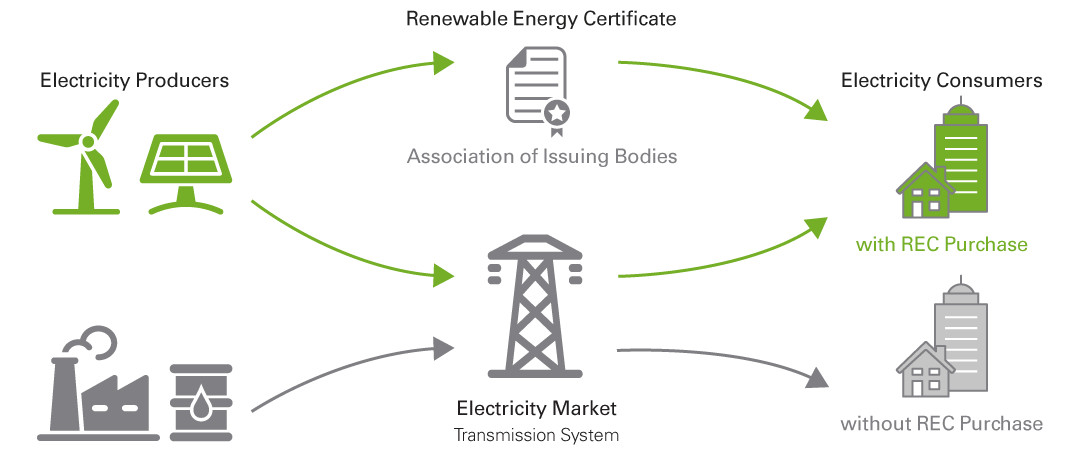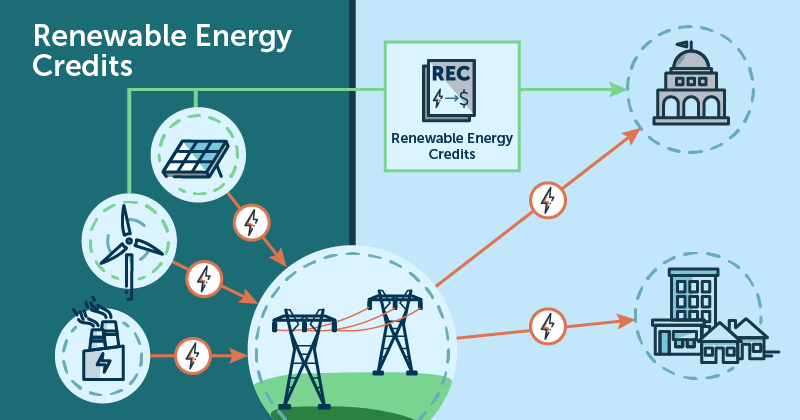Renewable energy credits are certificates that reflect the energy provided by renewable energy sources such as solar or wind power plants. Purchasing RECs is not the same as purchasing electricity. RECs, on the other hand, indicate the clean energy characteristics of renewable electricity.
What precisely are renewable energy credits?
Renewable energy credits are marketable, non-tangible commodities that demonstrate that one megawatt-hour (MWh) of electricity was generated from a renewable energy resource and then put into the common system of power lines that transport energy.
What are renewable energy credits?

Electricity enters the system through various sources, including wind and solar energy, as well as natural gas and nuclear power. As a result, it is impossible to determine the actual source of your electricity. You may overcome this problem by purchasing RECs along with your power. RECs are certificates that convey to the owner the “renewable” qualities of renewable energy. In other words, renewable energy credits, when combined with grid electricity, are renewable energy created on your behalf.
The advantages of RECs
RECs are official proof that you are using RECs from the grid without having to instal solar panels or other RECs systems at your home or business. This allows you flexibility, especially if your company has many locations or lacks the infrastructure to instal solar panels. Your company can lower its carbon footprint by using RECs.
Purchasing RECs also benefits the renewable energy market by sending a demand signal to the market, which stimulates additional renewable energy production. As a result, RECs not only assist businesses in meeting their greenhouse gas emission targets, but they also promote the creation of more renewable energy.
If you fulfil the following criteria, RECs are a good fit for you:
- Want to support the renewable energy market but are unable to instal solar panels or other RECs technology at your home or business?
- Have environmental goals you are attempting to achieve as a business or individual?
- Want to know where your electricity comes from?
How do renewable energy credits become available?
Renewable energy credits are generated when a renewable energy source (wind, solar, hydroelectric, etc.) creates one MWh of power and transfers it to the grid. For example, if an onshore solar power station generates 5 MWh of electricity, it will have 5 renewable energy credits to sell or keep.
We previously reported that New York Governor Andrew Cuomo will enable New York building owners to acquire renewable energy credits (RECs) to comply with Local Regulation 97 (LL97), a game-changing new law aimed at reducing emissions in the Big Apple. We’d want to teach you all you need to know about renewable energy credits, including what they are, how they function, and how they’re generated. This essay will cover all of this, who buys RECS, and what their benefits are.
The distinction between RECs and SRECs
Solar renewable energy certificates (SRECs) are a form of renewable energy credit generated only by solar panels. SRECs, like RECs, are tradable commodities for renewable energy facility owners. These facilities must be solar in the case of SRECs.
Some states have “solar carve-outs” in their Renewable Portfolio Standards. An RPS with a solar carve-out requires that a particular percentage of the state’s power generation originate directly from solar panels, in addition to requiring renewable energy production. SRECs are used to account for the energy generated by solar panels.
For every megawatt-hour (MWh) of electricity generated, homeowners and commercial companies receive one SREC. They can then sell these SRECs to power companies. In some markets, an SREC may be worth $300 or more, and a typical 5 kW residential solar system might earn you six SRECs each year.
Who should purchase RECs?
RECs are suitable for environmentally-minded businesses looking to minimise greenhouse gas emissions. Whole Foods and Starbucks are two prominent purchasers of RECs.
- Renewable energy credits might be beneficial to your business if you:
- want to assist the renewable energy industry
- are having difficulty installing solar panels or executing efficiency initiatives at your house or company
- want to minimize your energy usage and carbon emissions
- have lofty environmental aims
It should be noted that certain businesses are mandated to acquire RECs. Electric utility companies must generate a specific percentage of their power from renewable sources. Renewable Portfolio Standards (RPSs) are rules in several states that set standards for renewable energy consumption. These rules require utilities to produce “renewable credits” as proof that they get a certain percentage of their power from renewable sources.










Add Comment